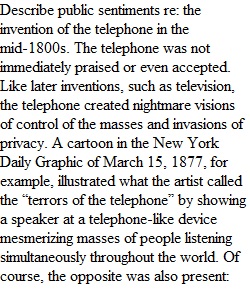


Q Week Two Assignment Keith & Hilliard Chapter 1 Questions As stated in your course schedule, these are the chapter questions you must answer for the week. Please send me your answers via the designated link (located directly under this post within this "Assignment" section of Blackboard) by Saturday by 6:00PM. Please note: for each week that you submit your assignment, you should keep a copy of the answers--they will serve as a study guide for upcoming quizzes / exams. Once you submit your answers, you will not receive them back from me unless I have a specific concern or question. I will post your grade online at the beginning of the following week. This week's questions are relatively short--longer ones will follow in upcoming weeks, but I realize that you are all getting acclimated to the start of the semester. CM 103 SURVEY OF RADIO AND TELEVISION In the Beginning...Genesis to 1920 ? Describe public sentiments re: the invention of the telephone in the mid-1800s. ? What were some of the adopted uses and experiments that emerged from Marconi s invention of wireless transmission in the early 1900s? ? Describe the 3 entities who were interested in radio in its early years? ? What were some of the initial demonstrations of radio used for? ? Describe the significance of wireless radio for sea travel? -List the various radio acts and their purposes ? What was AT&T s role in the engineering developments of wireless radio? ? When & why did musicians and music publishers become concerned/interested in radio? ? What contributions did colleges and universities provide in the developments of broadcasting? ? What other delays complicated radios arrival as we know it today? ? What were some of the fears about radio s potential expressed by the U.S. Navy? ? Describe GE & RCA s establishment.
View Related Questions